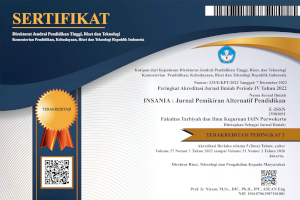Model Pembelajaran IPA Berbasis Kecerdasan Spiritual di Sekolah Dasar pada Materi Evolusi Darwin
Model Pembelajaran IPA Berbasis Kecerdasan Spiritual di Sekolah Dasar pada Materi Evolusi Darwin
DOI:
https://doi.org/10.24090/insania.v22i2.1208Keywords:
Science Learning Model, Spiritual Intelligence, Darwinian evolutionAbstract
Learning model is a planning or a pattern used as guidance in planning learning in the class or learning in tutorials and to define devices learning belong books, movie, computer, curriculum, and others. Science is a collection of knowledge composed in systematic, and the use of in general limited to symptoms the worlds. One studying in science is the evolution of, namely a change in living things or species also gradually going down. In science learning need to associated with intelligence spiritual to avoid possible misuse of religion and trust against the lord. Because it was necessary the development science learning model based intelligence spiritual in primary school to the matter darwinian evolution with use the model integration. Learning model is in accordance with the 2013 curriculum to teach a material through themes or thematic. The integration of science teaching models they are based on spiritual intelligence. For that, science subjects can be integrated with other subjects that support spiritual intelligence bases such as Islamic Education and Citizenship Education. The integration created a model of intergrated. The development model of science learning based spiritual intelligence in elementary school on a matter of Darwinian evolution has an advantage among other students feel happy with the relationship and the interrelationships between various fields of study, broaden horizons and appreciation of teachers, if it can be implemented well, it can be used as learning models are ideal in the school environment "integrated day", leads people to have a vision, always feel the presence of God, directing people to always dhikr and pray, directing people to always improve the quality of patient, leads people to tend to the kindness, empathy, high-minded, as well as happy serve.Downloads
References
Agustian, Ary Ginanjar. 2010. Emotional Spiritual Quotient, The ESQ Way 165 1 Ihsan 6 Rukun Iman 5 Rukun Islam. Jakarta: Arga Publishing.
Campbell, Neil A & Jane B. Reece. 2008. BIOLOGI: Edisi 8 Jilid 2. Jakarta: Penerbit Erlangga.
Fogarty, R. 1991. How to Integrated The Curricula. United States of America: IRI/Skylight Publishing. Inc.
Gardner, Howard. 1995. Multiple Intelegences The Theory in Practice. New York: Basic Book.
Hamid, Ahmad Abu. 2009. Penyusunan RPP (Rencana Pelaksanaan Pembelajaran) Ilmu Pengetahuan Alam (IPA). Yogyakarta: UNY.
Kemendikbud. 2013. Materi Pelatihan Guru Implementasi Kurikulum 2013. Jakarta: Badan Pengembangan Sumber Daya Manusia Pendidikan dan Kebudayaan.
Makmun Mubayidh. 2006. Kecerdasan dan Kesehatan Emosional Anak terjemahan Muhammad Muchson Anasy. Jakarta: Pustaka Al-Kautsar.
Pemerintah Republik Indonesia. 2003. Undang-Undang Republik Indonesia Nomor 20 Tahun 2003 Tentang Sistem Pendidikan Nasional. Jakarta: CV.
Pusat Kurikulum. 2006. Panduan Pengembangan Pembelajaran IPA Terpadu SMP/MTs. Jakarta: Balitbang Depdiknas.
Rusman. 2011. Model-model Pembelajaran: Mengembangkan Profesionalisme Guru. Jakarta: Rajagrafindo Persada.
Sanjaya, Wina. 2011. Strategi Pembelajaran Berorientasi Standar Proses Pendidikan. Jakarta: Penerbit Kencana Prenada Media.
Siswanto, Wahyudi & Lilik Nur Kholidah & Sri Umi Mintarti. 2010. Membentuk Kecerdasan Spiritual Anak. Jakarta: Amzah.
Suriasumantri, Jujun S. 2005. Filsafat Ilmu. Jakarta: Pustaka Sinar Harapan.
Suyanto, Slamet. 2005. Pembelajaran untuk Anak TK. Jakarta: DIKTI.
Tasmara, Toto. 2001. Kecerdasan Ruhiah (Trancendental Intelligence) Membentuk Kepribadian yang Bertanggung Jawab, Profesional dan Berakhlak. Jakarta: Gema Insani Press.
Tebba, Sudirman. 2004. Kecerdasan Sufistik. Jakarta: Kencana.
Trianto. 2010. Mendesain Model Pembelajaran Inovatif-Progresif. Jakarta: Kencana Prenada Media Group.
Trianto. 2011. Model Pembelajaran Terpadu. Jakarta: Bumi Aksara.
Yahya, Harun. 2002. Menyibak Tabir Evolusi, Terjemahan Effendi dkk. Jakarta: Global Cipta Publising.
Yulaelawati, Ella. 2004. Kurikulum dan Pembelajaran. Bandung: Penerbit Pakar Raya.
Zohar, Danah dan Marshall, Ian. 2004 SQ: Memanfaatkan kecerdasan Spiritual Dalam Berpikir.
Downloads
Published
How to Cite
Issue
Section
License
Authors who publish with this journal agree to the following terms:
Authors retain copyright and grant the journal right of first publication with the work simultaneously licensed under a Creative CommonsAttribution-ShareAlike License that allows others to share the work with an acknowledgment of the work's authorship and initial publication in this journal.
Authors are able to enter into separate, additional contractual arrangements for the non-exclusive distribution of the journal's published version of the work (e.g., post it to an institutional repository or publish it in a book), with an acknowledgment of its initial publication in this journal.
Authors are permitted and encouraged to post their work online (e.g., in institutional repositories or on their website) prior to and during the submission process, as it can lead to productive exchanges, as well as earlier and greater citation of published work (See The Effect of Open Access).








